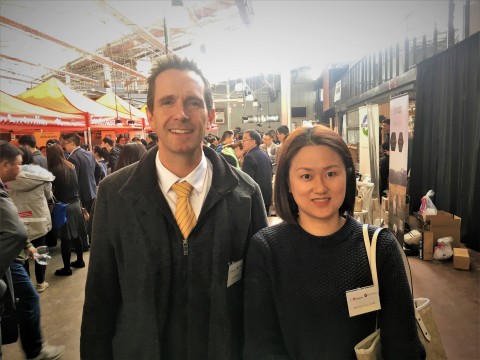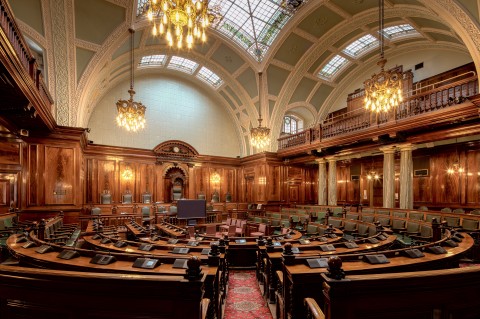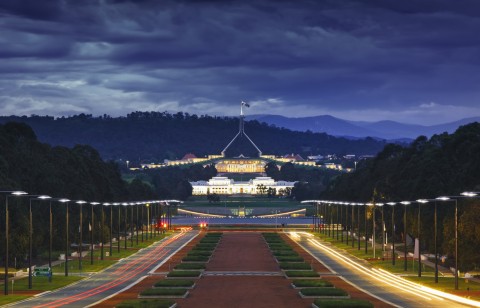The Department of Home Affairs requires Australian Skilled Visa applicants to provide detailed information regarding their qualifications and employment history. To ensure you meet the Australian qualifications, Home Affairs requires that you complete a migration skills assessment form an assessing authority.
Call +61 8 8351 9956 Email [email protected]
Most Recent News
All News
In the past month, the South Australian government has finalized some ground-breaking developments for the state. First, we witnessed the creation of a new visa, the SISA visa, which aims to attract an array of young dedicated entrepreneurs. Second, a massive contract has been signed to transform Whyalla steelworks industry. Most notably though, this morning Adelaide has been granted the headquarters for Australia’s first dedicated space agency.
“This Is what vision looks like”
- Prime Minister Scott Morrison
The application process and processing times for the Australian Offshore Partner visa 309/100, Prospective Marriage Visa 300, and Onshore Partner Visa 820/801 can be very long. To be eligible for a Partner Visa you must be legally married to, or in a de facto relationship (common law), with an Australian citizen or permanent resident.
1. Apply for The Right Partner Visa
Although this may seem straightforward it depends on your eligibility and whether there is enough evidence to support the visa application and whether your visa conditions allow you to apply for another visa. Migration Agents can assist in the application process by informing you on the correct Partner, Marriage, or Spousal Visa you should apply for.
There are three types of partner visas that you may be eligible for:
Prospective Marriage Visa (subclass 300)
The Prospective Marriage Visa subclass 300 also known as the Fiancé visa, as it allows a person to come to Australia and marry their fiancé within 9 months of being granted.
You then apply for the combined temporary and permanent partner visa 820/801 in Australia after marriage and within the 9-month period of the visa.
Onshore Partner visa (subclass 820/801)
The Onshore Partner Visa subclass 820/801 is an application for visa applicants to make while they are physically in Australia. Visa applicants must check their current visa conditions to ensure that they are eligible to apply for the Partner visa application as well as providing the minimum criteria
Offshore Partner visa (subclass 309/100)
The Offshore Partner Visa subclass 309/100 is an application for visa applicants who are physically outside of Australia and is granted when the applicant is outside of Australia. Applicant should check other eligibility criteria before applying for the Partner visa application as well as providing the minimum criteria
2. Certified Documents & Translated Into English
The Partner Visa is a combined application for permanent residency. The Department must be satisfied with your identity. Therefore, before you apply for the visa, ensure that you have already had your identity documents certified as true copies and if they are not in English, have the documents translated by an accredited NAATI translator.
3. Meet the Partner Visa Criteria - Demonstrate Good Evidence from Early On
You probably did not think about applying for a partner visa when you first met your soul-mate, but as time goes on, you think to yourself that being separated from each one another is simply not an option. You want to see each other every day for the rest of your lives but demonstrating that your relationship meets the criteria for a Partner Visa is a different story.
Your number one aim is to get a successful partner visa through fast. To do this you need to demonstrate that you and your partner have been together for the period you say. For de facto partner visas, demonstrate that you have lived together for at least 12 months (subject to exemptions). For married couples, you must demonstrate that you have a genuine and continuing relationship from at least the time of marriage or better if you had met and courted each other for a period before marriage. Each relationship should demonstrate a reasonable amount of evidence taken from the beginning of the relationship up to the period of lodgement demonstrating that your relationship is genuine and continuing to the exclusion of all others. You need to meet the definition of De facto or the definition of a Spouse.
What is special about your relationship that the Department should grant the visa without delay?
All relationships are different and unique; there is no doubt that your relationship is genuine and continuing. If you have a hard time demonstrating good evidence from early on, chat to us – we can give you the advice you need to overcome the ambiguity of demonstrating a genuine relationship.
4. Demonstrate You & Your Sponsor Are People of Good Character
You will be required to provide police checks from the country you came from and any other country you have spent 12 months or more in the past 10 years.
You may be thinking that that minor traffic offense does not need to be declared. It does. All applicants are rigorously tested against the Australian Government’s character test. By not declaring any minor infringements with the law you may be providing false and misleading information to the Department that could result in the Partner Visa refusal and a 3-year ban on applying for any further visas in Australia.
If you or your sponsor have convictions, you will need to explain to some degree why you are a person of good character. If you have concerns about your background and whether you need to declare any previous convictions or the impact of your convictions then contact us immediately for a confidential discussion.
5. Update the Department on Your Relationship/ Respond Immediately to Requests for Information
The long processing times illustrate that many Partner Visas are being lodged; this means that your partner application must stand out from the crowd and effectively, make it easy for the case officer to make an assessment. By meeting the minimum criteria in a Partner visa you are ensuring that you have made an application for a valid visa but go one step further and strengthen your application with overwhelming evidence that your relationship is genuine and continuing to the exclusion of all others
6. Demonstrate That You Will Be an Asset to Australia
You are more than your relationship. You have hopes and dreams to build your future not only with your partner but to do so in Australia. What will your contribution be? Perhaps you are a teacher? A nurse or have skills that the Australian economy values. Have you built ties to Australia through community and friendships? Your contribution to Australia can be more than being the life partner of an Australian Citizen or Permanent Resident sponsor.
7. Get Advice Before It Is Too Late
It is never too late to get advice, especially before you lodge the Partner Visa application. Planning for the application is the best way to get your Partner Visa lodged correctly and meeting the criteria for it to be a successful application.
Your circumstances are different from anyone you know, it is not advisable to rely on their experience, particularly if you have a complicated matter. Our Registered Migration Agents supply tailored advice to your circumstances – we have expertise in this area and understand that this highly stressful and daunting situation can cloud your judgment.
How to Put Together a Good Quality Partner Visa Application
Do you need help with an Australian visa application?
At Work Visa Lawyers we are experienced in assisting applicants in all matters relating to Australian visa applications. Our areas of expertise include Partner Visas, Skilled Migration visas, Business Skills Migration visas, Employer Sponsored Work Visas and other Family Migration visas as well as the Administrative Appeals Tribunal (AAT) Review, Judicial Review and Ministerial Intervention.
Contact us at This email address is being protected from spambots. You need JavaScript enabled to view it. or +61 8 8351 9956
Related Links:
FAQs - Effects of Coronavirus on Australian Partner Visas
How to Put Together a Good Quality Partner Visa Application
Australia Partner visa processing times update March 2017
Australian Visa Refusal Notification Options For The Appeal & Review Process (Tribunal & Ministerial Review)
Sources
http://www.austlii.edu.au/cgi-bin/viewdoc/au/legis/cth/consol_act/ma1958118/s5cb.htm
http://www.austlii.edu.au/cgi-bin/viewdoc/au/legis/cth/consol_act/ma1958118/s5f.html
https://www.workvisalawyers.com.au/services/partner-visas.html
https://immi.homeaffairs.gov.au/visas/getting-a-visa/visa-listing/prospective-marriage-300#howto
https://immi.homeaffairs.gov.au/visas/getting-a-visa/visa-listing/partner-onshore/permanent-801
https://immi.homeaffairs.gov.au/visas/getting-a-visa/visa-listing/partner-offshore
(Article updated 04 November 2021)
In 2018, the Australian Government passed the Migration Amendment (Family Violence and Other Measures) Act 2018. This new legislation changes the way partner visas are processed and may significantly prolong the processing times for Partner Visas in Australia. Although the Department has not yet confirmed a start date, the 13th of November 2021 has been suggested and looks like a likely time for the changes to be implemented. So what does this all mean for you and what should you do about it?
Work Visa Lawyers was pleased to accompany some of our business visa holders to the ACBC South Australian & Immigration SA Central Adelaide Trade Showcase. We would like to thank Immigration SA, as well as the China Business Council (ACBC), and KPMG for hosting the fantastic event.
South Australian immigration has a new investment visa; The subclass 408 Temporary Activity – Supporting Innovation in South Australia stream. Also known as the South Australian Entrepreneur visa, the subclass 408 pilot program will run from 21 November 2018 to 30 November 2021. The strong focus of this visa on entrepreneurship moves migration in South Australia into a new space, as the South Australian government strives to stimulate innovation.
Who is the new South Australian Entrepreneur Visa for?
The Supporting Innovation in South Australia (SISA) - Temporary Activity (subclass 408) visa is aimed towards promising and successful overseas entrepreneurs. According to Migration SA , South Australia will be looking for migrants who are innovative, have an entrepreneurial idea or concept, or are working on an innovative early-stage business ideally with a Minimum Viable Product (MVP).
The visa will likely be more successful for many entrepreneurs than the current Entrepreneur Visa, which requires capital backing of at least $200,000. Instead of requiring this funding,, applicants’ proposals will be vetted by State or Federal Government entities, with these entities able to partner with incubators and accelerators to identify potential applicants for nomination.
What will the South Australian Entrepreneur Visa allow me to do?
Successful applicants will receive a 408 visa that will be valid until November 2021. Applicants will have until this time to establish and grow their business in South Australia. While living in South Australia during this period, visa holders will be able to apply for other visas if they wish to do so. This was confirmed by the Department of Home Affairs in their Supporting Innovation in South Australia media release .The usual pathways to permanent residency will be available, and if the visa holder’s business operations in South Australia are running well then this will be helpful to them in any further visa applications.
How do I secure a South Australian Entrepreneur Visa?
The first step in the process is to secure an endorsement by the government of South Australia. Before applying, for government endorsement, applicants have the option of seeking support from one of the four South Australian innovation eco-system service providers. According to the Immigration SA website, priority for government endorsement will be given to applications that have secured the support of one of these providers. It is therefore strongly recommended that applicants secure the support of one of the providers before applying to Immigration SA (the relevant South Australian government body) for endorsement.
To seek support from an eco-system service provider, email the provider briefly explaining your business concept and asking if they would be willing to accept and support your application to the government of South Australia. For information on each of the four providers, see the ‘South Australian innovation eco-system service providers’ section below.
The Immigration SA website provides detailed information on the steps an applicant must follow.
Once the endorsement of the South Australian government has been secured, an application must be lodged with the Department of Home Affairs for a 408 visa. The relevant stream for SISA applicants is the ‘Australian Government endorsed event’ stream.
What are the eligibility requirements?
The following requirements must be satisfied in order to secure an endorsement by the South Australian government.
- Commitment to SA: Maintain primary residence in SA throughout the visa period
- Be under 45 years of age
- Demonstrate at least vocational English (unless a citizen of the UK, Canada, NZ, USA, or Ireland)
Have a business concept, idea or proposal that satisfies the following:
- You have in-depth knowledge or expertise in the product or service you are targeting
- Business concept demonstrates genuine innovation, novel intellectual property, or high barriers to entry
- Commitment to developing a start-up project in SA
- Secured support of a selected service provider who has reviwed your project proposal
- The project has strong potential to create local employment and export revenue for SA
- The project will have at least 50% of its assets and 50% of staff located in SA
Proposals in the following industry sectors will receive priority:
- Defense and Space
- Cybersecurity, big data, digital and blockchain
- Food, wine, and ag. Tech
- Health and medical technology
- Robotics
- Media and film
The following business types are not eligible for endorsement:
- Cafes and restaurants
- Consulting firms and employment agencies
- Export/import businesses/companies
- Franchises
- Foot reflexology
- Massage parlours
- Acupuncture and traditional Chinese medicine
- Herbal dispensing businesses
- Geomancy/Fengshui business
- Retail
If you currently hold one of the following visas you will not be eligible for endorsement
- Student visas (including subclasses 500, 570, 571, 572, 573, 574)
- 403
- 771
o If you are currently on a subclass 485 visa, you must be presently engaged in a structured program offered by an identified South Australian innovation eco-system provider to be considered
Financial capacity – You must satisfy the requirements in the table below
If you satisfy the above requirements, you will be eligible for endorsement by the South Australian government. Satisfaction of these requirements is sufficient to satisfy the Department of Home Affairs requirements for the 408 visa. Therefore, if SA government endorsement is received then you will be eligible for a 408 visa.
South Australian innovation eco-system service providers
The Innovation and Collaboration Centre
The Innovation and Collaboration Centre (ICC) is a partnership between the government of South Australia, the University of South Australia, and DXC Technology. The ICC supports early-stage startup businesses throughout the stages of idea generation, startup, and scaleup. The ICC provides a unique environment that offers services and expertise in business growth, business management, strategy and marketing, commercialization, design, and technology. They have particular expertise in the space sector, and Immigration SA recommends applying to the ICC for support ‘if you are building a company using space technologies or creating tech, services or products for the space industry’.
- If you would like to apply to ICC for support, you can do so by sending them an email at This email address is being protected from spambots. You need JavaScript enabled to view it.
- Explain in 50 words or less your business proposal, and including your contact details. The subject of the email should read ‘SISA Business concept inquiry’.
The Moonshine Lab is a tech startup co-founder that is looking to help entrepreneurs launch their ideas. Moonshine Labs recognizes that every entrepreneur is different and will be at different stages in their start-up journey and can assist accordingly. They focus on connecting entrepreneurs with the contacts they need to get their idea off the ground.
- Contact email: This email address is being protected from spambots. You need JavaScript enabled to view it.
- Explain your business proposal in 50 words or less, with the subject line ‘SISA Business concept inquiry’.
The New Venture Institute (NVI)
The New Venture Institute is an institute of Flinders University. The NVI aims to build the capacities of individuals, businesses, educators, and researchers so that they thrive in uncertainty. NVI does this by linking business, government and the community sector to the University. If you have an idea that would benefit from this sort of connection, the NVI might be the eco-system service provider for you.
- Contact email: This email address is being protected from spambots. You need JavaScript enabled to view it.
- Explain your business proposal in 50 words or less, with the subject line ‘SISA Business concept enquiry’.
ThincLab is the University of Adelaide’s startup incubator with headquarters in South Australia and a global network of sister-sites. ThincLab supports entrepreneurs and founders from any industry sector with mentoring, training programs, workspace, prototyping facilities and access to investors.
- Contact email: This email address is being protected from spambots. You need JavaScript enabled to view it.
- Explain your business proposal in 50 words or less, with the subject line ‘SISA Business concept enquiry
Ongoing obligations
If the applicant can meet the requirements and is issued the SISA Temporary Activity (subclass 408) visa, there are certain obligations that must be met throughout the visa period. According to Immigration SA, applicants who are issued with the SISA Temporary Activity (subclass 408) visa must:
- Observe and participate in the schedule planned for you by the service provider if you used this pathway – all participation arrangements will be between you and the service provider;
- Actively participate in South Australian Government planned innovation and entrepreneurial events relevant to your project/idea/proposal;
- Participate in surveys related to SISA that may be conducted by your service provider or the South Australian Government;
- Create a business that has the potential to become a sustainable high-growth start-up, with the future potential to employ South Australians;
- Assist in building the capacity of the South Australian business community through engagement with the local entrepreneurial and innovation community;
- Maintain primary residence in South Australia and contribute to the South Australian economy and community.
Immigration SA also provides a more detailed list of obligations.
408 Temporary Activity Visa processing times
According to Immigration SA, it currently takes eco-system service providers an average of 8 weeks to process applications for support. It then takes Immigration SA a further 2 weeks to process applications that have secured service provider support. Once SA government endorsement is secured, the application to the Department of Home Affairs is merely a formality. However, this may still take some further time to be processed.
Do You Need Help with An Australian Visa Application?
At Work Visa Lawyers we are experienced in assisting applicants in all matters relating to Australian visa applications, including state sponsorship applications. Our areas of expertise include Skilled Migration visas, Business Skills Migration visas, Employer-Sponsored Work Visas, Partner and other Family Migration visas as well as Migration Review Tribunal, Judicial Review and Ministerial Intervention.
If you require further information regarding your Australia visa options you can contact us through:
(08) 8351 9956
or This email address is being protected from spambots. You need JavaScript enabled to view it.
Sources:
https://www.migration.sa.gov.au/resources/faq/supporting-innovation-in-south-australia-sisa#06
https://www.migration.sa.gov.au/entrepreneur/endorsement-application-process
https://immi.homeaffairs.gov.au/visas/getting-a-visa/visa-listing/temporary-activity-408
https://apply.migration.sa.gov.au/user/login.php
https://www.migration.sa.gov.au/resources/faq/supporting-innovation-in-south-australia-sisa?q=SISA
https://minister.homeaffairs.gov.au/peterdutton/Pages/supporting-innovation-in-south-australia.aspx
https://www.migration.sa.gov.au/entrepreneur/eligibility-criteria-and-requirements?q=SISA
https://www.migration.sa.gov.au/entrepreneur/south-australian-innovation-eco-system-providers
Australian Visa Refusal Notification Options for the Appeal & Review Process (Tribunal & Ministerial Review) AAT - Judicial Review - Visa Rejection - Intervention - Policy - Obligations - Requirments - How to Re-Apply
Australian Occupation Lists & Skills Assessments for TSS Subclass 482 Visa, Employer Sponsored Permanent Visa - ENS 186 - RSMS 187 - Vetassess (Direct Streams & Temporary Resident Transition Streams)
We are often approached by clients who are confused as to whether their occupation requires a skills assessment in order to be eligible for a TSS subclass 482 visa or other employer-sponsored visa.
The ACT 190
After several months the ACT 190 nomination program will reopen on 29 November 2018 with a new nomination process.
New Working Holiday Subclass 417/426 Visa Policy Encourages Regional Work, Extends Visa lengths, and Raises Maximum Age For Canadians and Irish
Popular News Tags
Services
Sign up to our Migration Newsletter
Copyright © 2026 MARA Code of Conduct Privacy Policy Disclaimer Site Map
Office: 212 Port Road, Hindmarsh, SA 5007, Australia
Post: PO Box 3057, Hilton Plaza, South Australia, 5033, Australia
ABN: 75 889 635 782














